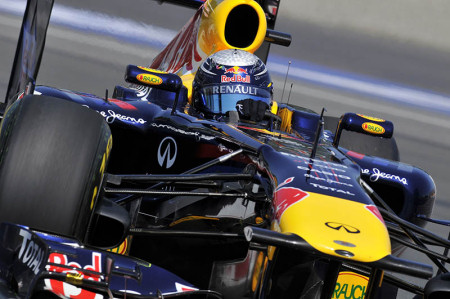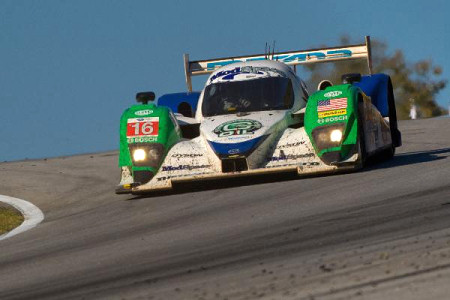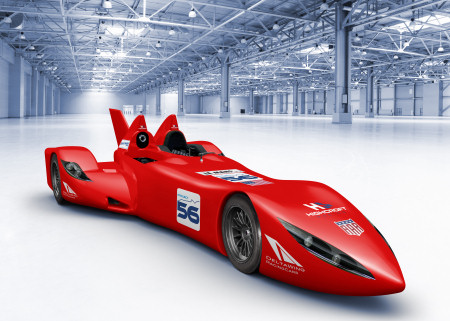The Way It Is/ Discussing racing's futureby Gordon Kirby |
 It was my pleasure to moderate a panel discussion about the future of motor racing at last week's IMIS Safety & Technical Conference in Indianapolis. The conference is presented by Safety-Kleen and held in conjunction with the International Motorsports Industry Show organized by NASCAR champion Tony Stewart, C&R Racing's Chris Paulsen, Jeff Stoops and Tom Weisenbach at the Indiana Convention Center in downtown Indianapolis. In only its third year the show has established itself as a thriving replacement for the departed PRI show (now ensconced in Orlando) with more than 600 exhibitors on the IMIS floor last weekend.
It was my pleasure to moderate a panel discussion about the future of motor racing at last week's IMIS Safety & Technical Conference in Indianapolis. The conference is presented by Safety-Kleen and held in conjunction with the International Motorsports Industry Show organized by NASCAR champion Tony Stewart, C&R Racing's Chris Paulsen, Jeff Stoops and Tom Weisenbach at the Indiana Convention Center in downtown Indianapolis. In only its third year the show has established itself as a thriving replacement for the departed PRI show (now ensconced in Orlando) with more than 600 exhibitors on the IMIS floor last weekend.
Former CART technical director Kirk Russell and retired Chrysler engineer Michael Royce organize the Safety-Kleen safety and technical conference in conjunction with the IMIS show. Russell served as CART's technical director for twenty-three years from 1979-'2001 and works these days as a safety and technical consultant. He's also responsble for setting up the St Petersburg street circuit each year. Royce is a retired Chrysler engineer who was in charge of the Lamborghini F1 engine program that raced with Lola and then Minardi between 1989-'93. Royce and his wife Suzanne also worked as chief technical inspectors at the United States GPs run in Detroit, Phoenix and Indianapolis and are deeply involved with Formula SAE and Formula Hybrid. Russell and Royce's safety and technical conference included forty presentations over two days covering a wide range of safety and technical matters from electric racing to spec engines for local short track racing. Drs. John Melvin and Dean Sicking were among those who updated us on the latest developments in seats, the Hans device and SAFER barriers and our panel discussion about racing's future took place at the end of the conference. We covered a lot of ground and I can only touch on some of the highlights.  © Gary Gold "When we think about the future of motorsport I think we need to think about attracting more categories of people--the people who are not interested in motor racing," Simon said. "The auto manufacturers are interested in our industry because we are producing car sales for them. It's about using your engine, your car, your aerodynamics and so on to go faster and be more efficient. Professional motor racing is a forum for people to achieve something new with the car and the technology. "I think the fans are attracted by diversity and are interested in technology but we need to show them more. It's true that in Formula One there is reasonably good technology but you don't see it from the outside. We need to show it more, to explain the technology." Simon told a story about his surprise at Kimi Raikkonen's reaction when he showed the Finn a Ferrari F1 connecting rod. "I was very surprised to see the shock when I showed a Formula One connecting rod to one of our Ferrari Formula One drivers," Simon remarked. "Until I showed him he did not realize how fine a piece of engineering it was and he was a F1 driver! So we need to show this to the public and the fans. It may interest more people in the sport and we need to do that because many people think motor racing is a useless sport. "For those people--and again, there many of them--we need to justify why we are there. We need to justify that we are helping technology progress and we are developing technology that will apply to production cars. If we do that successfully there is a better possibility that more people will believe in the value of racing. We have to be sure to make racing more palatable to more people. Otherwise I believe over the coming years there is more and more chance that some countries could decide to make racing not possible. "So I think looking to these two categories of people--both the racing fans and the people who are not fans of racing--that bringing more technology to motor racing is a good thing and will be a help to motor racing in the future." Forrest Jehlik is a research engineer at Argonne National Laboratory's Advanced Powertrain Research Facility. A former GM R&D engineer Jehlik conducts advanced vehicle research on plug-in hybrids and alternative fuel solutions and serves as technical lead on Argonne Lab's Green Racing Initiative which is closely associated with the ALMS and a variety of other forms of racing. "Almost everybody has a smart phone these days and we change them every couple of years," Jehlik observed. "New stuff comes along and changes arrive so quickly today. Racing is competing against video game systems like Grand Turismo 5 that are just superb. That's the market today's youth are familiar with and that's our competition. "There's nothing more exciting than racing but when you step back and take a look at some of the racing organizations a lot of them are very reluctant to accept new things. A lot of race cars for example still have carburetors! But the technology that we integrate and play with every day comes so fast and so quickly and the young people pick it up and love it and run with it.  © Courtesy of Regis Lefebure, Dyson Racing Jehlik believes motorsports down to the grassroots should be more accepting and encouraging of new tehcnology. "I believe in the big road philosophy," Jehlik adds. "There are going to be F1-like boutique, specialised engines. There's space for that. But at the base of the pyramid the local guys and kids have to be able and motivated to come out on the weekend and race things they can afford. Let them work with labtops and calibrations so they can eke out that edge against each other. That gives it to them and makes it theirs. "If you start with a strong base that makes the sport strong. But it seems to me that because of the politics in racing the base of that pyramid is rough in many places." Scot Elkins is COO and technical director of the ALMS and IMSA. Elkins discussed the ALMS's struggle to attract a better field of prototypes to America's most open, technology-friendly form of racing. "The primary thing that makes the ALMS unique is the rulebook allows different drivetrains, different engines and different fuels," Elkins said. "That's a big part of the ALMS and it feeds the manufacturer involvement which has always fed the sport over the years. The manufacturers participate in our series to prove their technology and go back to the 'Win on Sunday, sell on Monday' type of approach that racing has always been about. "If a rulebook allows for technology, it will come. But it also comes in phases and in terms of how the economy is working. Our GT fields have never been stonger. It's massive and incredibly tough and probably some of the best racing anywhere right now. But our prototype field is not as great as it used to be. "Prototype cars are very expensive to develop," Elkins added. "Audi and Peugeot are the only guys in the LMP1 game at the top level. They're battling against each other but they are utilizing the battle to promote technology. Audi came to race in America to tell everyone in this country that a diesel doesn't have to be a loud, clanking, smokey car. Part of their sales strategy has been the process of telling everyone about the TDI concept." But both Audi's and Porsche's prototypes have departed the ALMS and the new World Endurance Championship has embraced only Sebring's ALMS round and not included the Petit Le Mans at Road Atlanta. "The World Endurance Championship has kicked us a little bit in taking away some of the manufacturer involvement," Elkins freely admits. "Now the manufacturers can race on different continents where they want to promote and sell their products. Everyone recognizes the growth possibilities in Asia whether it be China or India or elsewhere. Now there's an additional platform that is truly worldwide for manufacturers to participate in and I think the World Championship has hurt the regional championships like the ALMS. It's obviously taken prototype content from our series. "The other part is that our economy is struggling. Back in 2004 I believe something like 17 million cars were sold in the United States. It's now down to about 11 million. As we all know, the economy has drastically changed. "The economy comes into play with what the manufacturers want to achieve. When we think about the last four or five years the best-selling vehicle in America is the Ford F150 pick-up truck and there's not a lot of technology there. If that is the best-selling car in America today you have to ask why would a manufacturer go racing to prove or sell technology in America? They don't have to because people are buying vehicles that don't have much new technology."  © Delta Wing "It seems like the new CAFE standards that are coming out for 2016 and 2025 that require manufacturers to have higher mpg ratings will push the manufacturers to developing new technology," Elkins comments. "The movement among the manufacturers to get better fuel economy should encourage more manufacturers to develop and prove new technology in racing. A few years ago nobody had a hybrid. But now, everybody's got a hybrid and there's more and more new technology arriving on the market. "Hopefully we're proving in some of the things we're doing that their technology will advance in the ALMS and it will advance faster and become better via racing. Our rulebook encourages it and that's why we race. "It's still about the manufacturers as it always has been in motor racing whether it's Formula One or NASCAR are CART back in the day. It's about the manufacturers wanting to show their technology in racing to help sell cars and it's no different today." Kirk Russell is an enthusiastic supporter of the Delta Wing and the 'open source' concept of managing the rules and development which was a key component of Ben Bowlby's overall Delta Wing concept. "The Delta Wing concept embraced more than a car," Russell noted. "It embraced a new look which I thought was important and it embodied a cheaper way to build a chassis that was a more substantially safe chassis and was a better package for dynamic stability on ovals. There was also an interactive program for fans to get involved and the Delta Wing embraced what's called 'open source', which I don't believe has been discussed anywhere near enough. "I think 'open source' really is the answer to a lot of our competition problems because it allows people to do the research and development to develop different things and allows other people to understand what those developments are without a lot of expense and to decide whether they want to get involved. It's totally transparent." Russell believes the 'open source' method would be a boon to any sanctioning body. "One the big challenges I had as a rule writer for some 25 years was the fact that you would write a rule with everybody thinking more or less in the same box and then something would come along that was outside that box. As far as I was concerned I felt that was all well and good. That was something we missed. But because that one guy took a different track then you had a big skirmish on your hands with the other car owners and manufacturers. And I think those skirmishes were very detrimental to the sport." Russell is like most of us in wishing racing would return to its roots with a more open rulebook and a desire to inspire as many competing car builders as possible. "If you look at Indy car racing there were milestones and they weren't as expensive in their time as some of the things we're looking at today," Russell remarked. "You had the Miller front wheel drive car--a very significant car. You had the roadster and then the lay-down roadster. Then you had the European invasion with rear-engine cars and then you had the ground-effect revolution. All these things made the sport different and drew fan interest to the sport, but you don't have that with a spec car." Gilles Simon has no doubts that spec car or one-make racing has no place in big-time motor racing. "I think single make or spec formula are very dangerous for the racing industry because for one Dallara there are many other manufacturers like Reynard, March and Lola that are not there now," Simon observed. "So we need to be careful that we don't drive the industry to being just one or two companies with no other choice. The more we limit the technology the more we will limit the choice and the competition and I think this is a bad direction. I think if you go to spec cars or spec engines or spec gearboxes you destroy our industry." Desite the efforts of some sanctioning bodies to subvert it the spirit of the free market will drive the future of the sport just as it has driven the past. |
Auto Racing ~ Gordon Kirby Copyright 2011 ~ All Rights Reserved |
